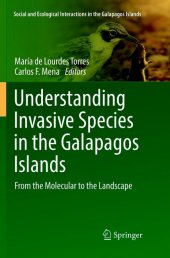 Neuerscheinungen 2019Stand: 2020-02-01 |
Schnellsuche
ISBN/Stichwort/Autor
|
Herderstraße 10
10625 Berlin
Tel.: 030 315 714 16
Fax 030 315 714 14
info@buchspektrum.de |

Carlos F. Mena, María de Lourdes Torres
(Beteiligte)
Understanding Invasive Species in the Galapagos Islands
From the Molecular to the Landscape
Herausgegeben von Torres, María de Lourdes; Mena, Carlos F.
Softcover reprint of the original 1st ed. 2018. 2019. xxvii, 237 S. 6 SW-Abb., 37 Farbabb., 36 Farbtabe
Verlag/Jahr: SPRINGER, BERLIN; SPRINGER INTERNATIONAL PUBLISHING 2019
ISBN: 3-319-88391-7 (3319883917)
Neue ISBN: 978-3-319-88391-5 (9783319883915)
Preis und Lieferzeit: Bitte klicken
This book investigates the introduction of invasive species and their behavior in oceanic islands. How can we define invasive species? What is their history? How did they come to dominate and transform ecosystems? These are relevant questions when trying to understand the behavior of invasive species-primarily in fragile ecosystems such as islands-and to understand the biological, ecological, social and economic impacts of invasions.
We chose the Galapagos Islands, a place well-known to be unique in the study of evolution, as a laboratory to analyze the interactions between invasive and endemic species, to understand the makeup of the ecosystems emerging after invasions have occurred, to describe the relationships of invasives with the people that live in these islands, and to try to develop comprehensive analyses on this topic from multi-scalar and multi-disciplinary points of view. For a long time, the discussion has been about how proper management of the species could achieve two main goals: the eradication of the species to recover affected ecosystems and the conservation of endemic species. The discussion has taken on other nuances, including the suggestion that an invasive species, when it is already adapted to an ecosystem, forms an integral part of it, and thus eradication would in itself go against conservation. On the other hand, some invasive species are not only part of the biological compound of the island ecosystems, but they also form part of the social and cultural history of the inhabited islands. Some of these identified by the local inhabitants are species of real or potential economic value.
Preface
Introduction: Introduced Species and the Threats to the Galapagos
Chapter 1. A Preliminary Assessment of the Genetic Diversity and Population Structure of Guava, Psidium Guajava, In San Cristobal.
Chapter 2. Genetic consequences of invasive species in the Galapagos Islands.
Chapter 3. Interactions Among Exotics: Guava and its Associated Fauna in the Highlands of San Cristobal.
Chapter 4. A Study Contrasting Two Congener Plant Species: Psidium guajava (introduced guava) and P. galapageium (Galapagos guava) in the Galapagos Islands
Chapter 5. Quinine tree invasion and control in Galapagos: a case study. Heinke Jäger
Chapter 6. Allelopathic Impacts of the Invasive Tree Cedrela odorata L. (Meliaceae, Sapindales=Magnoliidae) in the Galapagos Flora.
Chapter 7. The Hitchhiker Wave: Non-native small terrestrial vertebrates in the Galápagos.
Chapter 8. Multi-Scale Remote Sensing of Introduced and Invasive Species: An Overview of Approaches and Perspectives.
Chapter 9. Remote Sensing of Invasive Species in the Galapagos Islands: Comparison of Pixel-Based, Principal Components and Object-Oriented Image Classification Approaches.
Chapter 10. Stakeholder Perceptions of Invasive Species and Participatory Remote Sensing in the Galapagos Islands.
Chapter 11: A Conceptual Framework for the Management of a Highly Valued Invasive Tree in the Galapagos Islands.
Conclusion: Conclusion and Management Implications.
María de Lourdes Torres, Ph.D.Vicedecana, Coordinadora BiotecnologíaColegio de Ciencias Biológicas y Ambientales, COCIBAUniversidad San Francisco de QuitoT: (+593) 2 297-1700 ext. 1746E-mail: ltorres@usfq.edu.ecDiego de Robles y Vía Interoceánica, Quito, Ecuador
Carlos F. MenaColegio de Ciencias Biológicas y Ambientales, COCIBAUniversidad San Francisco de QuitoT: (+593 2) 297-1700, ext. 1866E-mail: cmena@usfq.edu.ec


